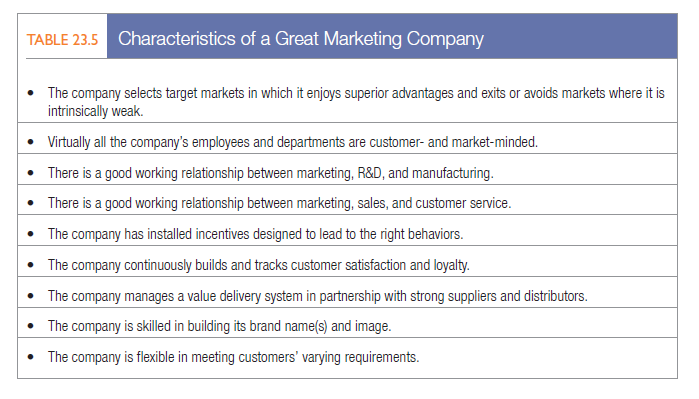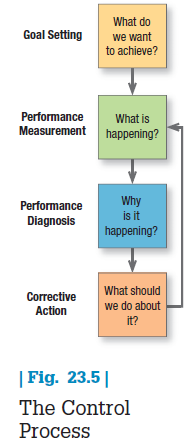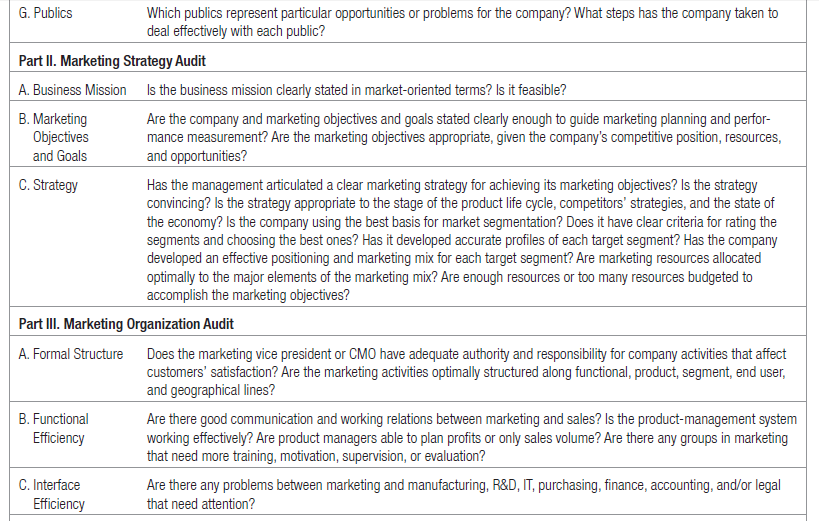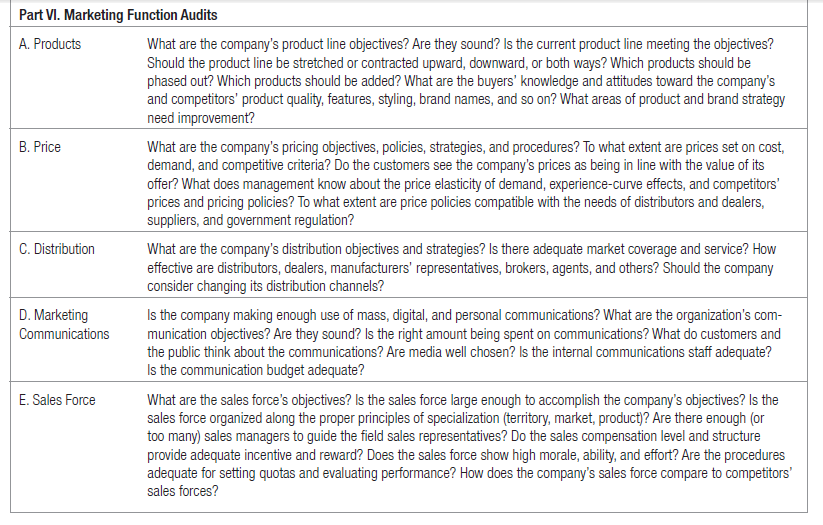Table 23.5 summarizes the characteristics of a great marketing company, great not for what it is but for what it does. Great marketing companies know the best marketers thoughtfully and creatively devise marketing plans and then bring them to life. Marketing implementation and control are critical to making sure marketing plans have their intended results year after year.
1. MARKETING IMPLEMENTATION
Marketing implementation is the process that turns marketing plans into action assignments and ensures they accomplish the plan’s stated objectives.72 A brilliant strategic marketing plan counts for little if not implemented properly. Strategy addresses the what and why of marketing activities; implementation addresses the who, where, when, and how. They are closely related: One layer of strategy implies certain tactical implementation assignments at a lower level. For example, top management’s strategic decision to “harvest” a product must be translated into specific actions and assignments.
Companies today are striving to make their marketing operations more efficient and their return on marketing investment more measurable (see Chapter 4). Marketing costs can amount to as much as a quarter of a company’s total operating budget. Marketers need better templates for marketing processes, better management of marketing assets, and better allocation of marketing resources.
Marketing resource management (MRM) software provides a set of Web-based applications that automate and integrate project management, campaign management, budget management, asset management, brand management, customer relationship management, and knowledge management. The knowledge management component consists of process templates, how-to wizards, and best practices. Software packages can provide what some have called desktop marketing, giving marketers information and decision structures on computer dashboards. MRM software lets marketers improve spending and investment decisions, bring new products to market more quickly, and reduce decision time and costs.
2. MARKETING CONTROL
Marketing control is the process by which firms assess the effects of their marketing activities and programs and make necessary changes and adjustments. Table 23.6 lists four types of needed marketing control: annual-plan control, profitability control, efficiency control, and strategic control.


ANNUAL-PLAN CONTROL Annual-plan control ensures the company achieves the sales, profits, and other goals established in its annual plan. At its heart is management by objectives (see Figure 23.5). First, management sets monthly or quarterly goals. Second, it monitors performance in the marketplace. Third, management determines the causes of serious performance deviations. Fourth, it takes corrective action to close gaps between goals and performance.
This control model applies to all levels of the organization. Top management sets annual sales and profit goals; each product manager, regional district manager, sales manager, and sales rep is committed to attaining specified levels of sales and costs. Each period, top management reviews and interprets the results. Marketers today have better marketing metrics for measuring the performance of marketing plans (see Table 23.7 for some samples).73 Four tools for the purpose are sales analysis, market share analysis, marketing expense-to-sales analysis, and financial analysis. The chapter appendix outlines them in detail.

PROFITABILITY CONTROL Companies should measure the profitability of their products, territories, customer groups, segments, trade channels, and order sizes to help determine whether to expand, reduce, or eliminate any products or marketing activities. The chapter appendix shows how to conduct and interpret a marketing profitability analysis.
EFFICIENCY CONTROL Suppose a profitability analysis reveals the company is earning poor profits in certain products, territories, or markets. Are there more efficient ways to manage the sales force, advertising, sales promotion, and distribution?
Some companies have established a marketing controller position to work out of the controller’s office but specialize in improving marketing efficiency. These marketing controllers examine adherence to profit plans, help prepare brand managers’ budgets, measure the efficiency of promotions, analyze media production costs, evaluate customer and geographic profitability, and educate marketing staff on the financial implications of marketing decisions.

STRATEGIC CONTROL Each company should periodically reassess its strategic approach to the marketplace with a good marketing audit. Companies can also perform marketing excellence reviews and ethical/social responsibility reviews.
The Marketing Audit The average U.S. corporation loses half its customers in five years, half its employees in four years, and half its investors in less than one year. Clearly, this points to some weaknesses. Companies that discover weaknesses should undertake a thorough study known as a marketing audit.74
A marketing audit is a comprehensive, systematic, independent, and periodic examination of a company’s or business unit’s marketing environment, objectives, strategies, and activities, with a view to determining problem areas and opportunities and recommending a plan of action to improve the company’s marketing performance.
Let’s examine the marketing audit’s four characteristics:
- Comprehensive—The marketing audit covers all the major marketing activities of a business, not just a few trouble spots as in a functional audit. Although functional audits are useful, they sometimes mislead management. Excessive sales force turnover, for example, could be a symptom not of poor sales force training or compensation but of weak company products and promotion. A comprehensive marketing audit usually is more effective in locating the real source of problems.
- Systematic—The marketing audit is an orderly examination of the organization’s macro- and micromarketing environments, marketing objectives and strategies, marketing systems, and specific activities. It identifies the most-needed improvements and incorporates them into a corrective-action plan with short- and long- run steps.
- Independent—Self-audits, in which managers rate their own operations, lack objectivity and independence. The 3M Company has made good use of a corporate auditing office, which provides marketing audit services to divisions on request.75 Usually, however, outside consultants bring the necessary objectivity, broad experience in a number of industries, familiarity with the industry being audited, and undivided time and attention.
- Periodic—Firms typically initiate marketing audits only after failing to review their marketing operations during good times, with resulting problems. A periodic marketing audit can benefit companies in good health as well as those in trouble.
A marketing audit starts with agreement between the company officer(s) and the marketing auditor(s) on the audit’s objectives and time frame and a detailed plan of who is to be asked what questions. The cardinal rule for marketing auditors is: Don’t rely solely on company managers for data and opinions. Ask customers, dealers, and other outside groups. Many companies don’t really know how their customers and dealers see them, nor do they fully understand customer needs.
The marketing audit examines six major components of the company’s marketing situation. Table 23.8 lists the major questions.





The Marketing Excellence Review The three columns in Table 23.9 distinguish among poor, good, and excellent business and marketing practices. The profile management creates from indicating where it thinks the business stands on each line can highlight where changes could help the firm become a truly outstanding player in the marketplace.
Source: Kotler Philip T., Keller Kevin Lane (2015), Marketing Management, Pearson; 15th Edition.

It’s really a nice and useful piece of info. I’m glad that you shared this useful information with us. Please keep us up to date like this. Thanks for sharing.
Thanks for your help and for writing this post. It’s been great.
Thanks for posting. I really enjoyed reading it, especially because it addressed my issue. It helped me a lot and I hope it will help others too.
I enjoyed reading your piece and it provided me with a lot of value.
Excellent read, I just passed this onto a friend who was doing some research on that. And he just bought me lunch because I found it for him smile Thus let me rephrase that: Thanks for lunch!
Great post. I was checking constantly this blog and I’m inspired! Very useful information particularly the remaining section 🙂 I maintain such information much. I used to be seeking this particular info for a very lengthy time. Thank you and best of luck.